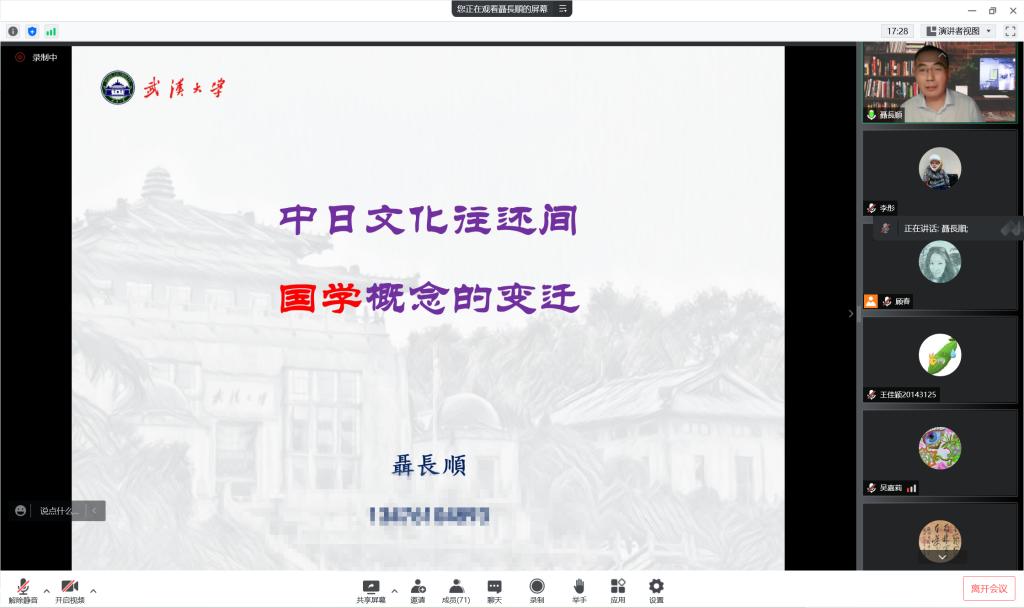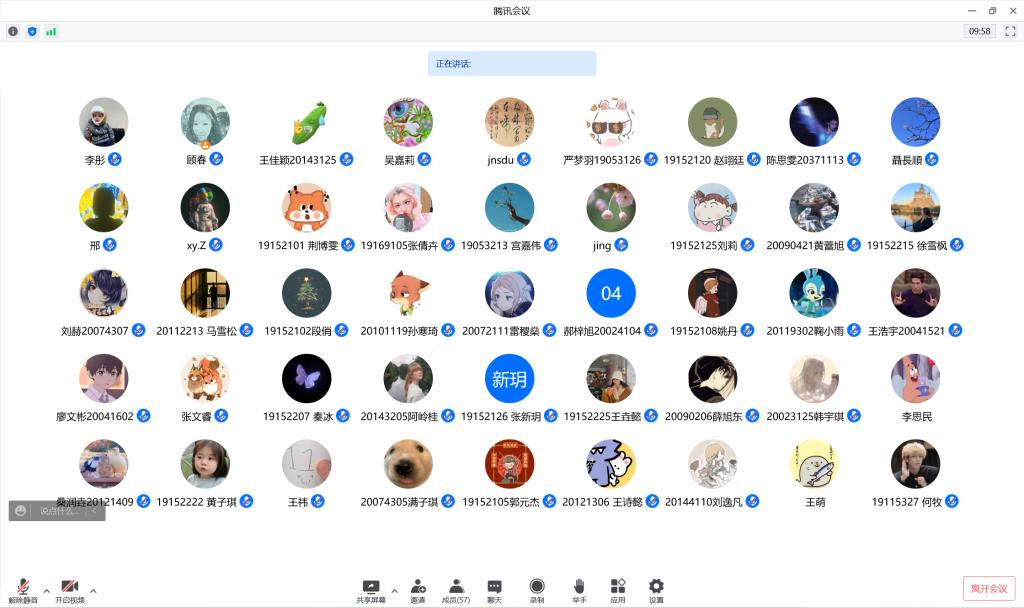
文法学部名师工作坊之中日文化往还间“国学”概念的变迁圆满结束
The Special Report on "Changes in the Concept of 'Sinology' in Sino-Japan Cultural Exchanges” of the Famous Teachers Workshop Series of the Faculty of Humanities and Social Sciences Ended Perfectly
2022年5月27日18时,北京工业大学文法学部、教务处、教师教学发展中心联合举办的名师工作坊通过腾讯会议平台顺利举行,本次讲座邀请武汉大学中国传统文化研究中心聂长顺教授,带来题为“中日文化往还间‘国学’概念的变迁”的专题报告。讲座由文法学部顾春老师主持,来自文法学部及其他学校共70余名师生聆听。
At 18:00 on May 27, 2022, the famous teacher workshop series lectures were jointly held by the Faculty of Humanities and Social Sciences, the Academic Affairs Office and the Center for Teaching Development of Beijing University of Technology through Tencent Meeting platform. Professor Nie Changshun from the Center for Studies of Traditional Chinese Culture of Wuhan University was invited to deliver a special report entitled "Changes in the Concept of 'Sinology’ in Sino-Japan Cultural Exchanges". The lecture was hosted by Gu Chun from the Faculty of Humanities and Social Sciences and learned by more than 70 teachers and students from the Faculty of Humanities and Social Sciences of BJUT and those from other universities.

本次讲座聂长顺教授以时间递进为线索阐述了“国学”一词在中日文化往还间的概念变迁。聂教授从“国学”一词在中国的古义谈起,指出“国学”为中华古典词,本谓国家设立的学校,到近代“国学”概念在学校意义上被赋予了国际性。接下来详细讲述了“国学”在日本的转义,聂教授指出“国学”概念传至日本后,最初指幕藩体制下“蕃”或“大名”设立的地方学校,17世纪以降,演变为与“汉学”、“兰学”相对的学术概念,指日本固有学术。随后通过分析黄纯熙、邓实等人有关国学的著述,阐明作为新概念的“国学”在于“真儒之学”,于清末由日本流入中国后多有阐发。对于由日本导入的近代“国学”概念,聂教授认为中国论者初心多在“国粹”(中国精神)的追寻与确立,因此就其进行了细致梳理,使听众对“立国之精神、独具之文明”有了更透彻的认知。在系统梳理中日文化往还间“国学”概念的变迁后,聂教授以中国学者章太炎“民族主义国学观”和王国维的“学无中西”论为代表,指明近代“国学”概念兼具思想与学术的双重品格。讲座的最后,老师同学们积极表达了自己的观点和想法,对于听众的热情提问,聂教授也一一给予了详细的解答。
Professor Nie elaborated the conceptual changes of the word "Sinology" in the process of Sino-Japan cultural exchanges with the clue of time development. He started from the etymon of the word "Sinology" in China and interpreted "Sinology" as a word that existed in ancient China. It originally meant a school established by the state. Since modern times, the concept of "Sinology" was transformed into an international concept on the basis of the meaning of school. Then he deeply introduced the transformation process of the concept of "Sinology" in Japan. Professor Nie interpreted that after the concept of "Sinology" was introduced to Japan, it initially referred to the local schools established by "han" or "Daimyo" under the Shogunate system. After the 17th century, this concept gradually evolved into a corresponding academic concept of "Sinology" and "Rangaku” which is specifically referred to as Japan's local academic concept. Later, he analyzed the works written by Huang Chunxi, Deng Shi and other authors on Sinology, and clarified that the quintessence of "Sinology" as a new concept was "Learning of True Confucianism", which had enlightened people with high ideals after it was introduced into China from Japan since the late Qing Dynasty. As for the concept of modern "Sinology" introduced from Japan, Professor Nie believed that the focus of Chinese scholars was to pursue and establish the "quintessence of Chinese culture" (Chinese spirit), so he conducted in-depth research and classification on it to make the audience have a more thorough understanding of the theory of "the foundation of the modern China, the characteristics of Chinese civilization". After systematically sorting out the changes in the concept of "Sinology" during the process of the cultural exchanges between China and Japan, Professor Nie analyzed the representative theories of Chinese scholar Zhang Taiyan's "Nationalist Sinology view" and Wang Guowei's "Shouldn't academic distinguish between Chinese academic and Western academic", and interpreted that the concept of "Sinology" in modern times has the dual nature both in thought and academic. At the end of the lecture, the teachers and students actively expressed their views and ideas, and Professor Nie also gave detailed answers to these enthusiastic listeners one by one.

此次讲座内容翔实、讨论深入,聂教授用幽默风趣、通俗易懂的方式对“国学”在中日文化往还间的概念变迁进行了细致入微的阐释,使得每一位听众都受益匪浅,引得与会教师同学们的纷纷赞许,本次讲座为教师和学生提供了交流学习的平台,进一步提升了学部教师教学能力和教学质量,助力课程的建设和学部的发展。
The lecture is informative and arouses in-depth discussions. Professor Nie explained the concept change of "Sinology" in the process of the Sino-Japan cultural exchanges in a humorous and easy-to-understand language, which made every teacher and student attending the lecture learn a lot and highly satisfied with it. The lecture provides a platform for teachers and students to communicate and learn, further improving the teaching ability and quality of teachers in the Faculty of Humanities and Social Sciences, and promoting the construction of disciplines and the development of the Faculty of Humanities and Social Sciences.
北京工业大学文法学部
Faculty of Humanities and Social Sciences
教务处
Academic Affairs Office
教师教学发展中心
Center for Teaching Development
2022年6月1日
June 1, 2022
